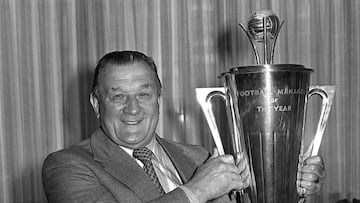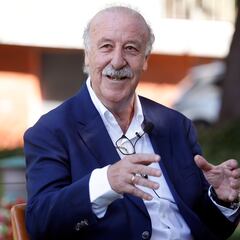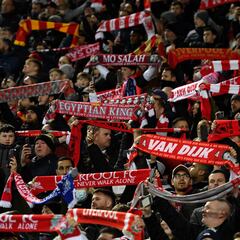Bob Paisley, the humble genius who ranks alongside Ancelotti and Zidane
Bob Paisley is legendary figure for Liverpool and the world of football. He, Ancelotti and Zidane are the three coaches to have won the most European Cups.

Football managers of yesterday were a totally different breed to their modern-day equivalents. In some ways, for his natural, calm approach, Carlo Ancelotti has something in common with the managers of years gone by - figures such as Bob Paisley (1919-1996), Liverpool’s legendary manager who never wanted to take the job in the first place. A genius whose carved out his career with humility, humour and hard work and became the first coach to win three European Cups - a feat which has since been matched by Ancelotti and Zidane, completing a podium of coaches with the most European crowns.
Excellence was constant throughout Paisley’s life in everything he did - no matter the job, he always gave his best and left his mark. He held down several jobs during his life - working as a miner, a bricklayer, footballer, soldier in the Second World War... finally, and somewhat reluctantly, ending up as manager at Liverpool, taking the reins from the great Bill Shankly and going on to guide the team through its most glorious era. His legacy remains as strong as ever at Anfield and his fascinating life story is one which deserves to be told.
The great Bob Paisley – Durham miner & Liverpool’s most successful manager – was born 100 years ago today. Bob is pictured taking the European Cup & First Division trophy back home to Hetton-le-Hole in 1977. He began his working life alongside his father at Hetton Lyons Colliery. pic.twitter.com/hl0svT6Dmh
— Durham Miners' Gala (@DurhamGala) January 23, 2019
Humble beginnings
In Hetton-le-Hole, a small mining village in County Durham, 11 kilometres from Sunderland, Bob Paisley was born on Thursday 23 January 1919. His parents - his father a miner and his mother a housewife, had four children. During his schooldays, Bob and his three brothers Willie, Hugh and Alan relied on social welfare help as food was in short supply. “We lived in a small, terraced house and although we never went short of life’s essentials, there was never much money left over by the end of the week,” he remembered. “It was a close-knit community, where coal was king and football was religion”. (Among Hetton-le-Hole’s other famous football sons are ex-Spurs winger Ralph Coates and Alan Kennedy, who scored the winner against Real Madrid in the 1981 final).
At 14 years of age, Bob left school and started to work with his father at Hetton Lyons Colliery. When his father suffered a serious accident, he left the pit to work as an apprentice bricklayer, playing football in his spare time.
In 1937, he signed for Bishop Auckland after being rejected by Sunderland for being “too small”. He earned three shillings and six pence per match. In 1939, aged 20, Liverpool entered his life. The Reds signed him for 25 pounds and gave him a salary of 8 pounds a week during the season and 6 pounds per week over the summer.
Paisley’s war
On 3 September, Paisley’s hopes of a career playing football were shattered. After playing just two days for the reserves, all matches and competitions were cancelled - war had broken out. He was called up for national service and assigned to the 73th Regiment of the Royal Artillery. But he was stationed in England and could still play the odd game of football after gaining permission from his superiors. However, in 1941 he was posted abroad, first taking part in the North African campaign, and wouldn’t return home until 1945.
The troopship with Paisley and his regiment on board took 10 weeks to reach Egypt because it had to take the long route, sailing down the west coast of Africa and past the Cape of Good Hope. He was sent to Egypt and took part in the battles of Tobruk and served as an anti-tank gunner with Montgomery’s Eighth Army, the Desert Rats, at El Alamein. He was injured and left temporarily blinded by sand from explosions during a Luftwaffe attack. In 1943, he was posted to Sicily and in June 1944, his unit was involved in the liberation of Rome.
He returned to England in 1945 and met his future wife Jessie, a school teacher, during an overnight train journey from Liverpool to London. Jessie was going down to the capital to visit a friend during half-term, Bob was on his way back to the Royal Artillery barracks in Woolwich and they ended up sharing the same compartment. In Jessie’s words: “Football always meant everything to him; he never seemed to think of anything else. He did other jobs like bricklaying and he was down the pits for a while but from what I could see, nothing really seemed to mean anything to Bob apart from football. I had no doubt that he would make it his career.” They married in 1946 and had two sons, Robert Jr., Graham and a daughter, Christine. When he returned from the war they were waiting for him.
Serial trophy winning manager Bob Paisley, captured & colourised as a player in the #LFC team of the late 40s/early 50s. He also served the Reds as a physio, coach and director. Plenty more pics like this in the book. Available to pre-order now. #Paisley #legend #SirBob 🔴⚽️🏆 pic.twitter.com/8UpGx7IkYH
— Old Liverpool FC In Colour (@OldLFC_Colour) March 11, 2022
Liverpool
He made his official, first team debut on 5 January 1946 lining up in the Liverpool midfield in a Third Round FA Cup tie against local rivals Chester. Liverpool won the game 0-2. He scored his first goal for the club on 1 May 1948 in a league game against Wolves.
During his playing career, Bob made 277 appearances for Liverpool and scored 12 goals.
He hung up his boots in 1954 but had spent the past four years training as a physiotherapist so he was kept on at the club as one of the backroom team. It is said that Paisley had built up such a vast knowledge about sports injuries that he could instantly tell what kind of injury a player had, and how long they were likely to be sidelined, just by observing how they walked - or limped...
In 1959, Bill Shankly joined as Liverpool manager and totally transformed the club. He kept all of the coaching staff and with Paisley as his assistant, Liverpool won:
After Liverpool beat Newcastle 3-0 in the 1974 FA Cup final, Shankly made the shock announcement that he was retiring and named Paisley as his successor. Paisley, a very modest, down-to-earth man and quite happy in his role as assistant manager, would later confess: “The last thing is the world that I wanted was to accept that job...” But not only carried on Shankly’s good work, he improved on it, turning Liverpool into a powerhouse on the European stage.
Bob Paisley led us to our first European Cup win in 1977 😍 pic.twitter.com/AKWF2DXQR1
— Liverpool FC (@LFC) May 23, 2022
Nine years later, he retired as the most successful manager in English football history, having won:
- 2 Division One titles
- 1 Division Two title
- 3 European Cups
- 1 UEFA Cup
- 3 FA Cups
- 3 League Cups
- 6 Charity Shields
He was the first coach to win three European Cups and the first to do it with the same club. In 2014, he was joined by Carlo Ancelotti (with two different clubs) and in 2018 Zinedine Zidane, who achieved the feat with Real Madrid.
#OnThisDay 1919: Bob Paisley was born.
— BBC Archive (@BBCArchive) January 23, 2019
Here is the legendary manager in 1977, accepting a BBC award on behalf of his League and European Cup-winning Liverpool side. pic.twitter.com/i5kheFxhHW
At the end of the 1982-83 season, this modest man, who had been a miner, a bricklayer and a soldier, loved and respected by his own players and rivals, who had taken Liverpool to the pinnacle of world football, said goodbye after 44 years’ service at the club. He passed away on 14 February 1996 aged 77. “Other people have earned more money than me in football, but no-one has enjoyed it as much as me,” he would say.
Bob Paisley statue unveiled at Anfield
In January 2020, eight years after Jessie passed away aged 96, the club unveiled an 8ft bronze statue of Bob, a 3-D replica of perhaps the most iconic image of Paisley during his time at Anfield. In full rescue mode, he is carrying his future captain, Emlyn Hughes off the field for treatment - all 11 stone of the 20-year-old left-half who was grimacing in pain with a heavily gashed knee and blood streaming down his leg after a challenge during a league game against Spurs in April 1968.
.@LFC have today unveiled a statue at Anfield of Bob Paisley, who went from player, to physio, to manager and won three European Cups at the club. pic.twitter.com/W42V3wu4Je
— MUNDIAL (@MundialMag) January 30, 2020
Related stories
That image summed up Paisley to a tee - selfless, strong as an ox, pragmatic - a man of few words who got on with the job but shied away from the limelight. When Liverpool signed centre-back Mark Lawrenson from Brighton for a record £900,000 fee in 1981, Paisley drove to Lime Street Station to pick him up - as an astonished Lawrenson recalled, “wearing a flat cap, cardigan and slippers”.
There was never any airs or graces with Bob Paisley, Liverpool’s most successful manager of all-time. As he put it himself: “This club has been my life. I would go out and sweep the street and be proud to do it for Liverpool FC if they asked me to…”

